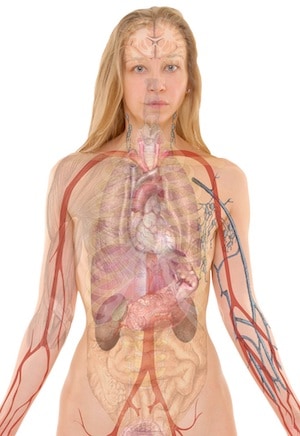Mast Cell activation symptoms… Where do I start; there are so many.
Why are there so many mast cell activation syndrome (MCAS) symptoms? Well, that’s because they are in almost every tissue in your body.
You have mast cells in your:
- Brain
- Eyes
- Ears
- Mouth
- Throat
- Gastrointestinal tract
- Respiratory
- Bladder
- Genitalia
- Rectum
- Skin
- Nerves
- Bones
Mast Cell Activation Symptoms can include:
- Fatigue
- Food, drug, environmental, and chemical sensitivities
- Chills
- Sweats
- Feeling cold all the time
- Inflammation
- Swollen lymph nodes
- Swelling
- Osteoporosis
- General muscular and bone pain
- Hyperflexible joints
- Anaphylaxis
Skin
Contents
Flushing, burning, hives, rashes, easily bruised, itching, dermatographia, urticaria, slow wound healing, hair loss, rosacea, psoriasis, eczema, nail issues.
Heart
Feeling faint or fainting, fast heartbeat, low blood pressure, feeling dizzy or lightheaded when standing up, chest pain.
Digestion
Mouth burning, tongue swelling, gum inflammation, abdominal pain, nausea vomiting, diarrhoea, constipation, reflux, bloating, throat tightness, the elevation of liver enzymes, high cholesterol, food sensitivities, food allergies, IBS, leaky gut.
Brain and Nervous System
Brain fog, headaches, anxiety, depression, nerve pain, loss of things you enjoyed, trouble with attention, dizziness, insomnia, tinnitus, numbness, sweating, tingling, vibrating, neurological symptoms like seizures, vertigo.
Lungs and Respiratory
Asthma, sinus congestion, postnasal drip, wheezing, shortness of breath, feeling like you can’t take a deep breath sinus swelling and cough.
Eyes
Inflammation in eyes, blurred vision, itchy, watery eyes, redness, gritty, sandy feeling in eyes, sensitivity to bright lights.
Reproductive System
Endometriosis, painful periods, hormone imbalance,
Urinary Tract Symptoms
Inflammation of tissues, burning even when not urinating, pain with urination, aching pain in the bladder. Unable to fully empty the bladder
Genitalia
Inflamed, itchy or burning sensation around the vulva or vagina, normally treated with it being an infection when there is none. Painful intercourse. Genital tract symptoms are uncommon in men but can cause inflammation in the prostate or other genital areas.
What makes mast cell activation syndrome get worse?
Mast cell activation symptoms can be made worse by several things:
- Stress
- Cleaning products
- Preservatives in Junk food
- Air pollution
- Seasonal allergies
- Foods high in histamine
- Paint fumes
- Perfumes
- Fragrances
- Temperature
- Pesticides
- Vibration
- Certain medications
- And still many more…

While we need mast cells to protect us from threats. If they become overactive, this is where they become a real problem going into hyperdrive and not turning off.
Mast cell activation syndrome symptoms vary greatly, which can cause a real problem in getting diagnosed. Many people spend years and years seeing lots of different specialists trying to get a diagnosis, spending thousands and thousands to be told there is nothing wrong and that your tests are fine. This can be very frustrating and upsetting and can take its toll on your mental health.
Mast cell activation symptoms – Who gets them?
MCAS is often found in individuals with hyper-mobility syndromes (Ehlers–Danlos syndrome), postural orthostatic hypotension (POTS) as well as chronic inflammatory response syndrome (CIRS) and tick-borne illnesses (Lyme disease and co-infections).
Patients are normally diagnosed with several other chronic conditions before receiving a mast cell activation syndrome diagnosis, they can include: IBS, MS and other neurological conditions, lupus, fibromyalgia, urticaria (hives), PANS, Crohn’s, anxiety, colitis, idiopathic anaphylaxis, asthma, oral allergy syndrome, acid reflux/GERD eczema and other dermatologic conditions, IC and chronic bladder infections and many more.
Mast cell activation symptoms can start from a young age becoming worse over time or they could be mild and barely noticeable and then something happens in your environment such as mould. Trauma can have a huge effect, it can be anything from an operation, marriage breakdown, a physical or emotional trauma, infection or virus.
Treatment for mast cell activation symptoms
Treatment for MCAS is very individual, what works for one doesn’t mean it will work for another, even if you have the same symptoms, it won’t necessarily work for you. What one may tolerate another may not. There are a number of treatments for mast cell activation symptoms such as Medications, supplements, environment changes, alternative therapy, and lifestyle changes. It can take patients a while to work out what works for them, and you might need several treatments to help you.
Having mast cell activation symptoms can cause more stress and worry. This can lead to a vicious cycle of symptoms. It’s important to manage your stress.
- By connecting with friends
- Resting
- Using mindfulness techniques
- Gentle exercise such as yoga or going for a walk
- Being out in nature
- Having a hobby
- Talking with a therapist
It’s very important to take care of your general and emotional health and well-being. Don’t let Mast cell activation symptoms control your life. it takes time, but it will get easier. With the right treatments to suit you, symptoms will ease and life will become much easier. See my mast cell activation syndrome page
